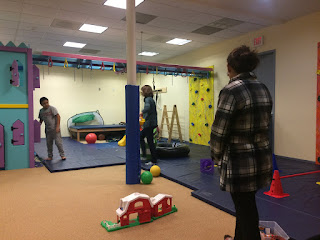A full two months have passed
since your first appointment at Southern California Food Allergy Institute - that appointment was incredible on so
many levels. First off, meeting the team that we had waited two years to meet was
finally here, I was starstruck when I first saw Dr. Randhawa walking around, I had to remind myself to breath, I mean this is the brain behind healing you!
The clinic
was not at all like I was expecting.
 |
| Walking into the Clinic for the 1st time. |
 |
| You were so happy, knowing that this day was finally here. We were the only patient in the waiting room. |
It was very understated and we were one of two patients the entire day. We talked with the team for four hours! They shared
information with daddy and I that we had never heard of before, which was
shocking because this would be the 21st doctor that you would see, what could
this doctor possibly tell us that we haven't heard or learned through our own
research? Well it was a lot. The team noticed we arrived with a binder filled
with different tabs that detailed out your labs, reaction history, supplements,
pictures, graph and trends, etc. They said, "a binder comes with a story." That's
an understatement. Since the first day of life we have been fighting to attain
optimum health for you. From jaundice and projectile vomiting to bleeding
eczema and constipation and then excess mucous/constant congestion and random
and severe allergic reactions to sensory processing disorder and GI issues.
The list goes on and on and all of these do not come with a "look." From the
outside, you look like a "normal" toddler. You are social,
adventurous, funny, intelligent, witty, coordinated, persistent, a leader and very focused and driven.
Daddy I and are so
excited to work with a team of doctors that can heal your insides so you
can live like a normal toddler and focus on learning and playing without fear
and sickness.
 |
| You were very accepting of Dr. Randhawa - a vast difference from your lack of openness with other doctors. |
 |
| After your appointment, you were exhausted. |
After talking with the doctors for hours, daddy and I
felt mostly overwhelmed but a sense of hope, that you are in the hands of a
team that will work to heal your body. After having our minds blown by the team, next you had to endure many tests including allergy skin testing and loads of blood draws. That same night, as we flew back to Maryland, we reveled in a feeling of hope so great, you could cry! That feeling was short-lived though, as you would have two more reactions just days after your consult appointment, and to seemingly safe foods. Daddy and I, again feel hopeless and thought, "what do we feed you?"; "how do we parent a child, we don't know how to care for?"; "will this get better?"; "will you have a reaction to this food today?" We immediately consulted Dr. Randhawa and he guided us into removing additional foods from your already very restricted diet. Then we
waited.
 |
| Another random reaction came with itchhing and hives. We managed it with emergency meds and the reaction did not progress. |
 |
| Dr. Randhawa determines this reaction is to soy, a food you have been eating for years. |
It seems like we are always
waiting with you, from being born at 42 weeks to waiting for lab results, doctors, referrals, etc., we have mastered the art of
patience that one must have parenting and caring for you. After we received some of the lab results back, we were told you needed to have an endoscopy to rule in/out some GI disease. Next we searched and searched and finally found a GI that would do the procedure without putting you on meds for 8 weeks preceding the scope. Now we waited for your appointment. A few days before your appointment, you came down with pneumonia!
 |
| At your ped, and your oxygen saturation was 93, so you had to do your first ever breathing treatment. A few more followed that day until your oxygen reached 96. |
Your first time ever needing antibiotics, which would require us to reschedule your scope procedure. MORE WAITING! I could scream or cry or both. The pneumonia was very scary, but you took to the antibiotics well and without any reaction. And now we waited for the rescheduled scope appointment...












